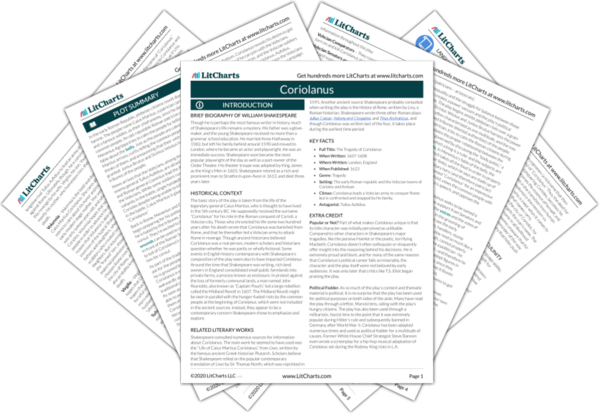Summary
Analysis
Caius Martius, Titus Lartius, along with Roman soldiers, are outside the gates of Corioles; a messenger approaches. Martius wagers that Cominius has met the enemy, and Lartius takes the bet, offering his horse against Martius’s. The messenger reports that Cominius is in view of the enemy, but they haven’t yet encountered one another. Martius tries to buy back the horse he just lost in the wager, but Lartius says he’ll only lend the horse back to Martius for fifty years.
The scene shifts to the battlefield, and Martius’ wager with Lartius heightens the drama for the audience, since they don’t know if the fighting has begun or not. Lending the horse back to Martius for fifty years is a way of winning the bet without actually taking the prize, demonstrating the male camaraderie between Martius and Lartius.
Themes
Martius invokes Mars, the god of war, and then the trumpets sound, signaling to the Volscians. Two Volscian senators enter on the walls of the city, and Martius cries out, asking if Tullus Aufidius is inside the city. One senator says no, and says that there are no men in the city that fear Martius less than does Aufidius. Rather than waiting for the Romans to try and attack the walls, the Volscians decide to open their gates and send their army out, warning that Aufidius is approaching.
Since Martius is a great warrior, it makes sense that he would invoke the Roman god of war. While he wants to win the battle, he seems more concerned with fighting his personal rival, suggesting he might be tied more closely to Aufidius than to Rome.
Themes
As the Volscian army charges, Martius tries to encourage the Roman soldiers. He tells them to be brave and to advance, even threatening them, but the Roman army is beaten back to their trenches (and off stage). Martius reenters, cursing the Roman soldiers and trying to rile them up. He calls them “shames of Rome” and a “herd of boils and plagues,” telling the men to charge the enemy, or else he’ll stop fighting the Volscians and turn on his own troops. He hopes to beat the Volscians back to their wives, as they have beaten the Romans back to their trenches.
Part of Martius’ role as hero is to encourage his fellow soldiers. In this role, however, he is ineffectual, and he becomes enraged with the soldiers comprised of common citizens. Calling them a “herd” emphasizes the herd mentality of the common people that he so frequently lambasts. Just as Aufidius said Martius is more hated in Rome than he is, so Martius hates Roman weakness and treachery more than the enemy, as shown by his threats of turning on his own troops.
Themes
The Volscian army reenters, and the Romans drive them back to the gates of Corioles, which open to readmit the Volscian army. Seizing the opportunity, Martius cries out for the Roman soldiers to be good supporters and follow him, as he runs after the fleeing Volscian soldiers through the gate—and then is shut in the city of Corioles.
Martius’ isolation and aloneness are emphasized in this heroic moment. He is a bold, daring, masterful soldier, but he is almost completely without support from common soldiers or citizens.
Themes
Get the entire Coriolanus LitChart as a printable PDF.

Two Roman soldiers remark that they have no desire to follow Martius into the city, considering him foolish and as good as dead. Titus Lartius enters and asks the soldiers what happened to Martius, and they reiterate that he’s probably dead. They describe how he chased after the fleeing enemy, entered the city gates, and found himself closed in “alone to answer all the city.” Lartius praises Martius for his nobility, saying he “sensibly outdares his senseless sword.” Thinking Martius is dead, Lartius characterizes his fallen ally as a perfect jewel, and as a “thunderlike,” “fierce and terrible soldier” who made his “enemies shake, as if the world were feverous and did tremble.” After this would-be hero’s goodbye, Martius re-enters, bleeding, followed by Volscian soldiers. Shocked, Lartius and the soldiers come to Martius’s aid and enter the city.
Again, Martius’ aloneness is emphasized alongside his excellence. Lartius describes him as the superlative of bravery, saying he’s braver than his sword, which is an inanimate object incapable of fear. The more heroic Martius becomes, the less like a human and more like something else he seems to be. In addition to being compared to a sword, Martius is compared to a god or a force of nature with “thunderlike,” and Lartius’s claim that Martius makes enemies shake as if the very earth is quaking. Lartius’s speech sets up the expectation that Martius is dead, making his bloody reentry all the more dramatic and heroic.
Themes
Literary Devices












